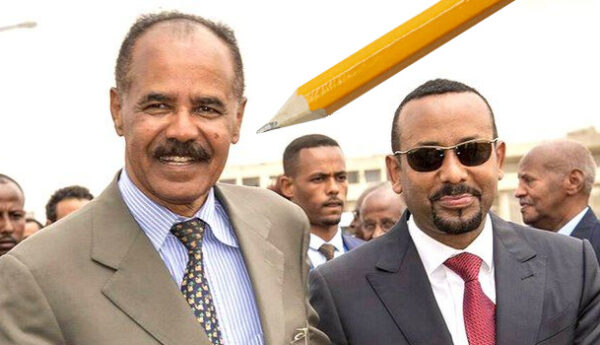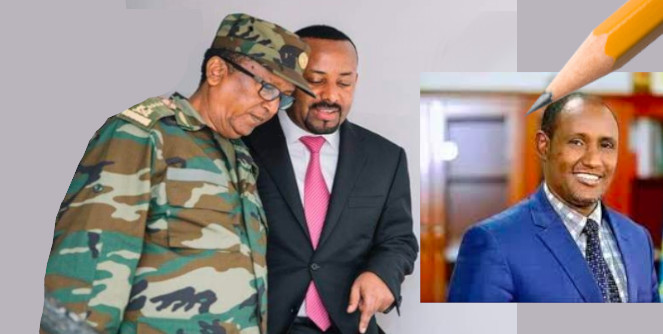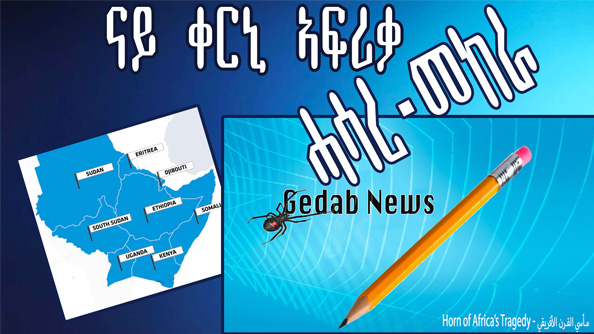2001-2011: Eritrea’s Wasted Decade

If Eritrea was a democratic republic and all the fronts, movements, groups were political parties, the Eritrean people would have voted “No Confidence” on every single one of them.
Eritrea’s self-imposed ruling party, the PFDJ, spent an entire decade in a futile effort to get the world to pay attention to the 2002 border demarcation ruling. Of course, the futility of this was entirely predictable to anyone who has a passing knowledge of how the world works: that those who win a war get to dictate the terms of surrender. But the PFDJ, which had fooled itself into believing it won the combat war and diplomatic war, waited in vain that the “international community” will compel the victor of the war—Ethiopia—to comply with the surrender terms. It is still waiting, and, left to its own devices, every indication is that it will wait for another decade.
Just last month, Ethiopia demonstrated once again that the PFDJ was completely incapable of defending Eritrean sovereignty. For reasons that are incomprehensible—what else is new—Dictator Isaias Afwerki said that Ethiopia violated Eritrean sovereignty to make the world forget that it has been violating Eritrean sovereignty for the last 10 years. This is like saying that a bank robber robbed a bank to make the world forget that he had robbed a bank once before. What was remarkable about the incursion is not that Ethiopia held a press conference to announce what had happened and may happen again, in the future. This is because Ethiopia was assured that nobody would give the Eritrean tyrant, with his bad-boy record, a sympathetic ear. And nobody did. What is remarkable is what the Ethiopian Foreign Ministry said after the event: “President Isaias did not and would not escalate because his survival would be at stake, not Eritrea’s.”
Isaias Afwerki had been justifying every offense and brutality against the Eritrean people by using the shield of “national security” and “national sovereignty” and the Ethiopians demonstrated again that he is entirely incapable of safeguarding Eritrean sovereignty if it means, as it does, endangering his own safety and hold on power. Eritreans now have the worst of all worlds: the indignity of having a neighbor cross Eritrea’s borders using any definition it sees fit (“national security”), and the indignity of having a dictator who says he must be a dictator to preserve their sovereignty—but can’t.
The Eritrean Opposition & Its Wasted Decade
The last decade was also a lost decade for the Eritrean opposition. For the last 10 years, the Eritrean opposition organizations have been doing what all companies who lost their sense of vision or direction do: re-organizing (commonly referred to as “re-org.”) They have been spending all their time branding and re-branding themselves. They have changed their names: Jihad becomes salvation, ELF-RC becomes EPP. They have changed their “incorporation”: fronts become movements; movements become parties; parties become individuals, inc. and forums become civil society. They have changed their logos, they have changed their stationery, they have traded their imaginary guns for imaginary pencils. Friends have become foes; foes have become friends. And every time they have found themselves on the losing end of an argument, they have blamed Ethiopia for “interfering in our internal affairs.” All this blur of activity was to create a sense of movement—to hide the fact that there was no movement, that it was all “Gam-Man, Left-Right, fi mekanek…” military drill, without the added benefit of having a military or making the organizations structurally fit. Pick any year from 2001-2011, pick any random year, and you will find that this “re-org” consumed more time than what is the alleged priority of these organizations: challenging the PFDJ and shortening its life.
The Alliance (AENF, then ENA, then EDA) was necessary because the political organizations in existence in the 1990s had completely different perspectives and, therefore, different ideologies and strategies which worked at cross-purposes from one another. Notwithstanding their evolving names, for the most, the 10 organizations (and 1 individual) who founded the Alliance in Khartoum, Sudan in March were former Marxists, practicing Marxists and Islamist groups. But notwithstanding their differences, the organizations had, for the most part, one thing in common: they were fragments of a liberation movement, the Eritrean Liberation Front. When the Alliance was conceived in 1999, it was with the noble intention of having all Eritreans opposed to tyranny to put their differences aside and focus on removing the “dictatorial regime of the Peoples’ Front and replace it with a democratic government based on the principles of political pluralism,” as its Charter put it.
The first shock to the system occurred in 2001: the year the G-15 (former PFDJ members) “defected” from the government to the Opposition. While they expressed their divorce from the PFDJ as something tragic that (with the exception of a few) most of them made every effort to avoid, the majority of them saved no punches in their characterization of the Alliance as “extremists”, “enemies of the people”, and “Ethiopian lackeys.” At the forefront of this destructive campaign of defamation was none other than Mesfin Hagos, who then had a huge following within the new opposition and his words poisoned the well.
It is hard to overstate how differently those with EPLF/PFDJ background and those with ELF background looked at the world. Ask an Eritrean with EPLF/PFDJ background what the most shocking news that happened in January 2001 was, and s/he is likely to tell you about the freezing or arrest of a G-15 or G-15-sympathetic Eritrean. Ask those with opposition background and you will hear about how the PFDJ went to a refugee camp and mowed down children in a refugee camp. There was one organization, ELF-RC, who, by virtue of its unique history and outlook, could be expected to be the bridge for the two groups, but it did not rise up to the occasion for the reasons we will explain.
The second shock to the system also occurred in 2001: that was 9-11. In a post-9-11 era, how sympathetic is the world going to be to an Alliance which included Islamists? The opposition (including in one instance, we are sad to say, awate.com) did not have a good answer to this question. But whereas everybody else regained their footing after the temporary shock, one organization, ELF-RC, went into a downward spiral of splintering, plastic surgery and endless temper tantrums demanding dramatic changes in the charter of the Alliance. The ELF-RC was already showing the strains when it withdrew its membership from the Alliance to protest the election of a “Johnny-come-lately”, Herui T Bairou*, as the leader of the Alliance—a soap opera that took months to remedy. After 9-11, its “soul-searching” (“In a post 9-11 world: is a person with a Muslim name the best face for the Eritrean opposition?”) would splinter it further—and that entire process sucked every ounce of energy of the Alliance for an entire decade.
There were other shocks to the system: The long absence of the strategist Abdella Idris, and Sudan’s turncoat actions denying its eastern zone, traditionally the base of Eritrean opposition. And Ethiopia’s ambiguous policy.
The Alliance has lived up to one and only one of its expectations: to convene a national congress. This national congress was, fairness compels us to state, the brainchild of the Alliance (EDA) including the ELF-RC. Accuracy also compels us to state that when it was being convened, a wing of the old ELF-RC was too busy to attend because it had yet another appointment with its plastic surgeon: to become EPP in preparation to be EPDP. The ELF-RC essentially became the EPLF-RC: now its political program devotes more space to animal husbandry than to the return and resettlement of Eritrean refugees. Through a series of self-inflicted wounds, it has made itself so inconsequential that a political organization whose entire reason for existence is the salvation of the Eritrean people is now begging the Eritrean people to help it save its leaders from abduction.
So now there is the question of the Eritrean National Conference for Democratic Change (ENCDC) and its relationship with the Alliance, i.e., the EDA. Should the EDA be dissolved? Is the EDA trying to dominate the ENCDC? Is the EDA trying to emasculate the ENCDC? Does the organizational chart of the EDA and ENCDC make sense? Should this person be in that position? Who reports to whom? Why was this person elected and why was that person not?
These are all Europe & North America-centric questions. The Alliance had as many hard-core and unrepentant Marxist organizations as it had Islamist organizations. But nobody asked “at this time and age should we have Marxists organizations? What will it mean to Eritrea to have Marxists organizations?” But they asked, “should we have Islamist organizations?” Why is that? Because, living in Europe and North America, being associated with Marxists poses no danger, but with Islamists it does. But, form an Eritrean perspective, which form of ideology poses a bigger threat?
With all due respect to everyone asking these questions, we think of them as no more than the continuation of the last wasted decade. The AENF became the ENA then became the EDA. The EPLF-DP became the EPDP. One wing of the ELF-RC became the EPP then the EPDP. Another wing of the ELF-RC became the ENSF. It is all re-arranging of chairs on the Titanic. The answer is really simple: SHOW RESULTS. Nobody, at this very late stage as Eritrea is in the emergency room hooked to IV tubes, is interested in discussing what college the doctor graduated from or what the paint color of the room is or why the nurse gave you a dirty look. DO SOMETHING. The EDA has been around for 10 years, it has been a huge disappointment, but it delivered one solid result: a national conference. The ENCDC has been around for 5 months. Before we can call for the removal, replacement, dissolution of the EDA, our question is: and to replace it with what? With part-time strugglers and stragglers? With people who don’t even have the time to lobby congress? People who do things only when they take a sabbatical from the university, or take a 3-week vacation from work? Is that, really, how we are going to save the Eritrean people? Are some calling for the destruction of organizations composed of full-time strugglers (however inept they may be), with part-time strugglers (who are giving every indication that they may be equally inept)?
Finally, to the youth organizations. Everybody is giving you advice, and we would like to give you ours. First and foremost, if you want to avoid the mistakes of those who came before you, the right path is not to avoid all contact with them, but to gather as much information as you can, from as diverse group as you can, to get different perspectives. Here’s our perspective:
(a) Avoid creating parallel universes. Diversity is not just a pleasant desired goal; but something that will help you speed up the struggle. If you surround yourself with people who share your background, your socio-economic status, your perspective, you are only delaying the inevitable: the rude awakening.
(b) Quality counts more than quantity: There is power in numbers; but there is even greater power in a dedicated few who have no confusion about what needs to be done and are willing to roll up their sleeves to get it done.
(c) Avoid the adoption centers: Just like Google, or Facebook, or Youtube who will approach you with advertisement the minute you build traffic, there are “NGOs” with noble-sounding names whose entire basis for existence is to sell numbers to their funding sources. They will promise you funding and prestige in exchange for you adopting whatever platform they are selling. Your mission and your independence mean nothing to them: you are just another addition to their portfolio. They will promise funding that will never come, “future bigger meetings” that will never occur. Avoid them like the plague that they are.
Conclusion
2001-2011 has been a wasted decade for Eritreans.
In 2002, when the border ruling was passed, this website called on the Eritrean government to enter into “dialogue” with the Ethiopian government. This is not because we believe, as some naive Eritreans still do, that the settlement of the border issue would compel Isaias to “implement the ratified constitution” (he won’t: because a constitution constrains his powers); it is not because we believe the demarcation of the border will suddenly bring about an era of peace between Eritrea and Ethiopia (it won’t: because Eritrea and Sudan have a “demarcated” border and that did not stop Isaias from exporting war); it is not because we believe that this will “pressure” the Isaias regime to dismantle the endless-conscription campaign (it won’t: because, technically, Isaias does not consider them “soldiers” but “nation builders.”) We called for a dialogue because we believe it will bring marginal improvement in the quality of life of Eritreans and Ethiopians who live in the border areas. Isaias’ bet that he could “pressure” Ethiopia to comply—either by use of diplomacy or guns—resulted in an AU call for sanctioning his regime (the first in the history of AU), as well as two UNSC sanctions.
Since 2001, the Eritrean opposition groups, who had been making steady progress to consolidate their gains since they formed an Alliance in 1999, have been engaged in fruitless re-organization and re-structuring campaigns. Like a directionless and visionless company constantly bringing consultants to tell it what to do, the Eritrean organizations have spent more energy on cosmetic changes than in working to execute the mission—“overthrow the dictatorial regime of the People’s Front and replace it with democratic government based on the principles of political pluralism.” Even more worrisome, it has not learned from the mistakes of the wasted decade: the spoilers change, but the spoiling continues.
The youth movements must maintain their independence at all costs—but in their effort to be independent they should not be ignorant of the factors that contributed to what made the last decade a wasted decade. Or they, too, will unwittingly be the prey of the spoilers and the adoption centers.
* Eritrean history is a series of cyclical events. One of the triggers for ELF’s demise was the non-election of Herui T Bairou in the 2nd National Congress, largely as a result of “foreign manipulation,” hastening the “Falool” movement, whose biggest critic was the late Seyoum O. Michael. Two decades later, the reason that the ELF-RC (then led by Seyoum O. Michael) gave for suspending its membership from the Alliance was the election of Herui T Bairou as a result of “foreign manipulation.”



Awate Forum